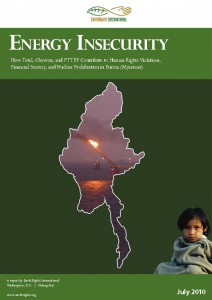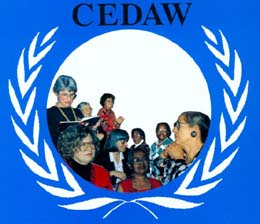Resources (827 found)
Energy Insecurity: How Total, Chevron, and PTTEP Contribute to Human Rights Violations, Financial Secrecy, and Nuclear Proliferation in Burma
 EarthRights International released an explosive new report that describes how the oil companies Total (France), Chevron (US), and PTTEP (Thailand) have generated over US $9 billion dollars in military-ruled Burma (Myanmar) since 1998, making their Yadana Natural Gas Project the single largest source of revenue for the country’s notoriously repressive dictatorship […]
EarthRights International released an explosive new report that describes how the oil companies Total (France), Chevron (US), and PTTEP (Thailand) have generated over US $9 billion dollars in military-ruled Burma (Myanmar) since 1998, making their Yadana Natural Gas Project the single largest source of revenue for the country’s notoriously repressive dictatorship […]
Dissecting the Data: Burma’s Macroeconomy at the Cusp of the 2010 ‘Elections’
Burma’s macroeconomy is unbalanced, unstable and largely without the institutions and attributes necessary to achieve transformational growth. Employing new data and techniques selected to gaze through the characteristic informational fog, this paper aims to examine the fundamentals of Burma’s macroeconomy as it stands at the cusp of the 2010 elections. These elections, already without political credibility, promise little in the way of the reforms Burma needs to achieve economic stability and growth […]
• • •Background on Karenni National Day
Throughout the centuries expansionist Burman kings engaged in war with the inhabitants of Karenni State as they encroached on the territory of the ethnic frontier states […]
• • •Union Election Commission Directive No.2/2010
Enlisting the strength of political parties
Introduction
1. For holding a free and fair multi-party democracy general election in 2010, the Union Election Commission is granting permission to set up political parties and register as political parties in accord with the Political Parties Registration Law […]
• • •Crimes against Humanity in Western Burma: The Situation of the Rohingyas
The Report examines whether the apparent cases of enslavement, rape and sexual violence, deportation or forcible transfer of population, and persecution against the Rohingyas may constitute crimes against humanity. It is based on extensive open-source research and on a fact-finding mission to Burma, Thailand and Bangladesh conducted by experts in international criminal investigation. As well as interviewing organisations working in the region, investigators met with Rohingya victims in and around refugee camps in Bangladesh […]
• • •Trafficking in Persons Report 2010
The 2010 Trafficking in Persons (TIP) Report marks the 10th anniversary of key milestones in the fight against modern slavery. It ranks countries according to minimum standards. Burma is ranked as one of 13 “Tier 3” countries that fail to meet these minimum standards in fighting the crime of human trafficking […]
• • •Monthly Chronology of Burma’s Political Prisoners in Burma – May 2010
Summary of current situation
There are a total of 2,157 political prisoners in Burma. This is an overall decrease of 42 in comparison to last month’s figure of 2,199 . In May 3 activists were arrested, 2 sentenced and 1 political prisoners was released.
Since the protests in August 2007 leading to September’s Saffron Revolution, a total of 1,159 activists have been arrested and are still in detention.[…]
Monthly Chronology of Burma’s Political Prisoners in Burma – June 2010
Summary of current situation
There are a total of 2,171 political prisoners in Burma. This is an overall increase of 14 in comparison
to last month’s figure of 2,157. In June, no activists were arrested and no political prisoners were
released. The AAPP also received information about activists who were arrested and released before
June 2010, and this retroactive information explains why there is actually an overall increase of 14
this month[…]
Burma: The Current State of Women in Conflict Areas – A Shadow Report to the 22nd Session of CEDAW
 The report focuses on education, health, State-perpetrated violence against women, and poverty, particularly as these issues relate to women in Burma’s rural conflict areas.
The report focuses on education, health, State-perpetrated violence against women, and poverty, particularly as these issues relate to women in Burma’s rural conflict areas.
Burma’s ruling military regime, the State Peace and Development Council (SPDC), in its various incarnations, has controlled the country since 1962. One of the SPDC’s chief preoccupations since it seized power has been to maintain “national unity and solidarity,” which it has attempted to accomplish through force […]
Campaign to End Impunity in Burma – Advocacy Toolkit
The BLC drafted this advocacy toolkit for the Campaign to End Impunity in Burma in order to educate a broader audience about the goals and messages of the campaign and to generate ideas about how others can become involved […]
• • •








 All posts
All posts